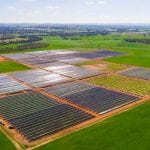Around The Web
Oregon should throttle complementary policies when rolling out carbon market -study
Drugs in bugs: 69 pharmaceuticals found in invertebrates living in Melbourne's streams
EU Market: EUAs near €18 following strong auction as rally continues
BHP Billiton facing £5bn lawsuit from Brazilian victims of dam disaster
Action launched in Liverpool against Anglo-Australian mining company after 2015 tragedy that killed 19 people
The worst environmental disaster in Brazil’s history has triggered one of the biggest legal claims ever filed in a British court.
The Anglo-Australian mining company BHP Billiton is being sued for about £5bn by Brazilian victims of the Samarco dam collapse in Mariana three years ago.
Continue reading...Taxing red meat would save many lives, research shows
The cost of bacon and sausages would double if the harm they cause to people’s health was taken into account
Taxing red meat would save many lives and raise billions to pay for healthcare, according to new research. It found the cost of processed meat such as bacon and sausages would double if the harm they cause to people’s health was taken into account.
Governments already tax harmful products to reduce their consumption, such as sugar, alcohol and tobacco. With growing evidence of the health and environmental damage resulting from red meat, some experts now believe a “sin tax” on beef, lamb and pork is inevitable in the longer term.
Continue reading...Is the wind turbine really a 'new apex predator'?
The presence of wind turbines can reduce the number of birds and lizards in an area, a new study has found. Should we start tearing the farms down?
Name: wind turbines.
Age: Early examples date to the 7th century.
Continue reading...Metop weather satellite prepares for lift-off
Oxford-Cambridge expressway would be illegal, warn MEPs
Plans for a road through wildlife-rich areas break EU laws and send a worrying message ahead of Brexit, say MEPs
Government plans to build an Oxford-Cambridge motorway over some of the UK’s most biodiverse nature reserves break EU laws and should be put on hold, according to a cross-party group of MEPs.
Up to a million homes could be built in the planned conurbation link-up which would carve across some of the UK’s richest floodplain habitats such as the Otmoor Basin and Bernwood forest.
Continue reading...UK renewable energy capacity surpasses fossil fuels for first time
Renewable capacity has tripled in past five years, even faster growth than the ‘dash for gas’ of the 1990s
The capacity of renewable energy has overtaken that of fossil fuels in the UK for the first time, in a milestone that experts said would have been unthinkable a few years ago.
In the past five years, the amount of renewable capacity has tripled while fossil fuels’ has fallen by one-third, as power stations reached the end of their life or became uneconomic.
Continue reading...Japan issues biggest batch of carbon credits yet under JCM, though volumes remain modest
Ozone: The Earth's protective shield is repairing
Why battery storage in Australia is unable to back up wind and solar
 Tesla and Genex push for rule changes that would allow battery and pumped hydro storage to be properly paired with wind and solar farms.
Tesla and Genex push for rule changes that would allow battery and pumped hydro storage to be properly paired with wind and solar farms.
The post Why battery storage in Australia is unable to back up wind and solar appeared first on RenewEconomy.
Mānuka honey: who really owns the name and the knowledge
NSW Vales Point coal plant to add 55MW solar farm
 Delta Electricity wins state approval to build a 55MW solar farm adjoining its ageing Vales Point coal power station on Lake Macquarie in NSW.
Delta Electricity wins state approval to build a 55MW solar farm adjoining its ageing Vales Point coal power station on Lake Macquarie in NSW.
The post NSW Vales Point coal plant to add 55MW solar farm appeared first on RenewEconomy.
Look, no batteries! How “flexible” solar can help the grid, without storage
 New study shows that solar plants can provide flexibility for grid operator that reduces use of thermal generators and battery storage, and delivers even lower emissions.
New study shows that solar plants can provide flexibility for grid operator that reduces use of thermal generators and battery storage, and delivers even lower emissions.
The post Look, no batteries! How “flexible” solar can help the grid, without storage appeared first on RenewEconomy.
Soot to solar: Unmasking the coal plant reliability myth
 The myth that coal power equates to grid reliability is not unique to Australia. Here's what happened when an old clunker was removed from the grid in northern Illinois.
The myth that coal power equates to grid reliability is not unique to Australia. Here's what happened when an old clunker was removed from the grid in northern Illinois.
The post Soot to solar: Unmasking the coal plant reliability myth appeared first on RenewEconomy.



